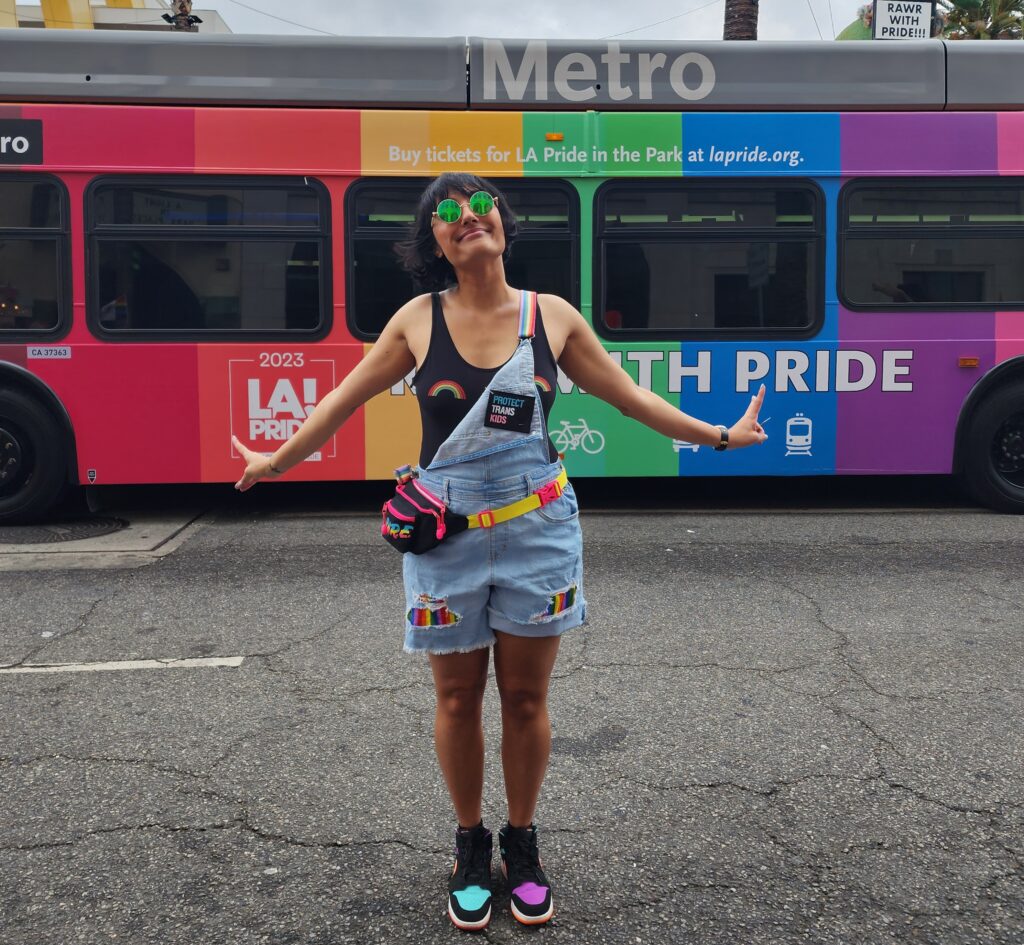
By Melanie Jamileh Prasad, JMA Legal Director
On this National Coming Out Day, as someone who is queer, Brown, and genderqueer, I’m reflecting on the immense privilege I have to work for an organization that supports me in being my authentic self. I was reminded of this when I sent out an email earlier this year letting my JMA colleagues know that I was going to be trying out new pronouns as part of my gender identity journey. I received warm and supportive messages from my supervisor and a few of my colleagues expressing appreciation for my openness and contributions to setting this as a workplace norm, but otherwise the change in my pronouns was accepted and respected with little fanfare or fuss.
Unfortunately, my experience is far from the norm for my LGBTQI+ siblings across the country. In comparison, 78 percent of LGBTQI+ adults reported taking at least one action to avoid experiencing discrimination based on their sexual orientation, gender identity, or intersex status, with half of them experiencing some form of workplace discrimination or harassment in the past year. The figures are even bleaker when narrowed to transgender and non-binary folx, with 90 percent having taken some action to avoid discrimination and 70 percent of them having experienced some form of workplace discrimination or harassment in the past year.
To be clear, sexual orientation and gender identity based employment discrimination has been illegal in all 50 states since 2020, when the Supreme Court issued its ruling in Bostock v. Clayton County.1 On top of that, 23 states, as well as the District of Columbia, have passed their own laws prohibiting discrimination based on sexual orientation and gender identity. But the truth is, laws preventing discrimination only go so far.
While anti-discrimination laws are useful as a way to deter companies from engaging in bad behavior, they are limited in the relief they can provide.2 Almost all of the remedies for these anti-discrimination laws involve monetary restitution; but to even get to that point, a worker must first file and litigate a complaint all the way through, all while having to recount and answer questions on the deeply hurtful experiences they suffered. Without additional behavior-shaping interventions, in the end, the most likely scenario is that the employee receives some monetary amount and then returns to the same discriminatory work environment they worked at, which is now even more hostile towards them after having been sued by them. With transgender individuals already experiencing twice the unemployment rate as cisgender individuals and over one-fourth of employed transgender individuals reportedly having a household income of less than $25,000, many individuals opt to just continue with their jobs, rather than file a complaint and risk jeopardizing their jobs.3
The harsh reality is that anti-discrimination laws alone are insufficient to actually improve working conditions for LGBTQI+ workers. Real meaningful change is won by people coming together to remake our communities, jobs and institutions more equitable through collective action.
We need more community benefits agreements that not only include strong worker equity provisions but also give community-based organizations the ability to help shape and improve workplace conditions. For example, our recent national CBA with New Flyer, not only includes targeted hiring, training, and promotion requirements for historically disadvantaged communities, but also includes requirements for independent organizations to support workers in filing workplace discrimination and harassment complaints, while also acting as a safeguard against retaliation.
We need policy levers that shape corporate behavior, like the Los Angeles County Metropolitan Transit Authority’s Manufacturing Careers Policy, that prioritizes the award of lucrative contracts to companies that, among other things, create targeted pathways to high quality careers for disadvantaged communities. And most of all, we need to organize, as the best way to improve working conditions for LGBTQI+ individuals will always be through the rights and protections offered by a collective bargaining agreement and unionization.
Anti-discrimination laws have undoubtedly made a huge difference in the lives of LGBTQI+ folx across the country. However, there’s still work to be done to ensure everyone has a safe place to work like I do. It’s up to us to demand more from companies and our elected officials. Only by coming together as full and whole people, standing together, can we fight to make our communities and jobs better for everyone.
1 Bostock v. Clayton County is the 2020 Supreme Court case that declared employment discrimination based on sexual orientation or gender identity illegal under Title VII of the Civil Rights Act.
2 See, for example, New York State Human Rights Law, which was amended in 2019 to explicitly prohibit discrimination based on gender identity or expression. The law included robust protections for trans and non-binary individuals, specifically enumerating things such as “refusing to use an individual’s requested name or pronouns” and “questions about gender identity or expression” as unlawful discrimination. While the remedies available under the law do include an order to rehire the employee, this is rarely awarded, and the remedies most often involve ordering the behavior to stop, some amount of damages, and some sort of requirement to undergo training or institute a policy change.
3 While retaliating against someone who has filed a discrimination complaint is also prohibited under anti-discrimination laws, as long as at-will employment exists, employers are often easily able to find a different justification for firing an employee. Additionally, if an employee has been unlawfully terminated, courts rarely, if ever, award reinstatement.
